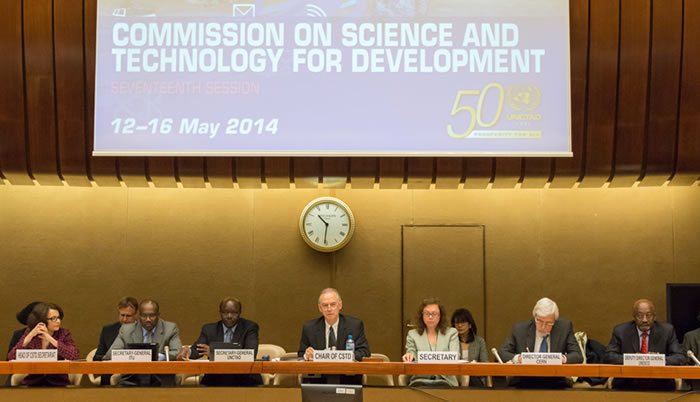Ministers focus on critical role of science, technology and innovation in the post-2015 development agenda at the opening of UN Commission on Science and Technology for Development (CSTD) at the Palais des Nations in Geneva.
Two ministerial roundtables were the highlights of the opening day of the seventeenth session of the United Nations Commission on Science and Technology for Development (CSTD) which was held in Geneva on 12-16 May.
The first roundtable focused on the review of progress made in the implementation of the outcomes of the World Summit on the Information Society (WSIS) in 2005. The second roundtable looked ahead with a discussion of the role of science, technology and innovation (STI) in the post-2015 development agenda.
A total of 21 ministerial speakers underscored the key role of science, technology and innovation for economic development in the future. The roundtables discussed a wide variety of issues such as the importance of creating an STI "ecosystem" through national plans, roadmaps and policy frameworks, building STI capacity into education systems and the role of STI in meeting development challenges in such sectors as healthcare, education and agriculture.
The roundtables were preceded by an opening ceremony featuring addresses by UNCTAD Secretary-General Mukhisa Kituyi, International Telecommunication Union (ITU) Secretary-General Hamadoun Touré, UNESCO Deputy Director General Getachew Engida and the Director-General of the European Organization for Nuclear Research (CERN) Rolf-Dieter Heuer. Ms. Amina J. Mohammed, Special Advisor to United Nations Secretary-General Ban Ki-moon on Post-2015 Development Planning, delivered a message by video during the ceremony.
 |
From left: Ms. Anne Miroux (Director of the Division DTL, UNCTAD and Head of the CSTD Secretariat), Mr. Hamadoun Touré (Secretary General, ITU), Dr. Mukhisa Kituyi (Secretary-General, UNCTAD), Mr. Andrew Reynolds (Chair of the CSTD), Ms. Lana Emelina-Sarte (ECOSOC Secretariat), Prof. Rolf-Dieter Heuer (Director General, CERN), Mr. Getachew Engida (Deputy Director General, UNESCO) |
Dr. Kituyi said that the transformative potential of science, technology and innovation cannot be overemphasized and requested the Commission to think deeply about STI's multifaceted development role. Dr. Touré drew attention to the importance of information and communication technology (ICT) and broadband in assuring sustainable development. He also provided information on the upcoming WSIS+10 High level event organized by ITU scheduled for June 2014.
Mr. Engida, said that technology alone is not enough - to empower people, STI must be married with skills and opportunities for all.
Professor Heuer, the Director-General of CERN, said that science is the basis of life in the world today, and underscored the importance of investing in basic science, technology, engineering and mathematics (STEM) education and explicitly incorporating investment into such education into the post-2015 development framework.
In a video message, Ms. Mohammed, Special Advisor to Ban Ki-moon on Post-2015 Development Planning, outlined the process of formulating the post-2015 development agenda and the vital role that access to STI will play in facilitating sustainable development goals.
Presiding over the roundtables was Andrew Reynolds, chairman of the Commission on Science and Technology for Development and Senior Adviser on Space and Advanced Technologies for the United States Department of State.



